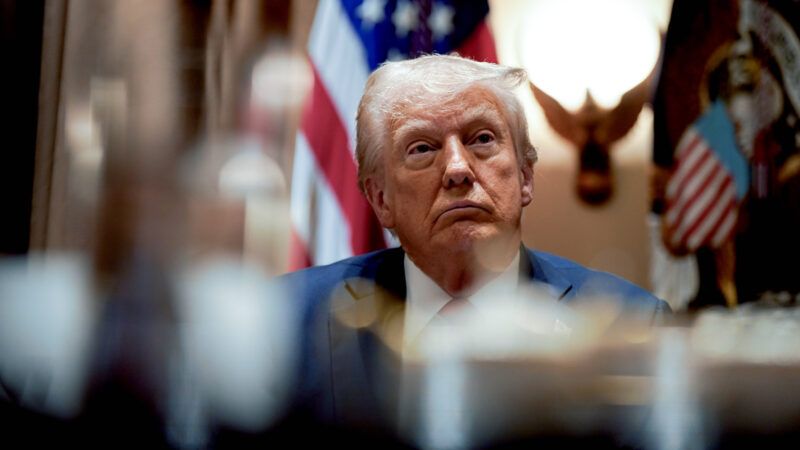Trump Promised To Lower Prices. Will Congress Help Him Deliver?
At the current rate of inflation, the dollar will lose 33 cents of purchasing power within a decade.

If President Donald Trump was elected with a specific mandate, it was to lower prices. Poll after poll reveals that inflation is a top worry for Americans. So the administration should be worried that it's ticking back up. Further, the president—who seems to think he can solve all problems unilaterally with executive branch orders—will soon discover that to conquer inflation, he will need the help of Congress.
Today's rising inflation isn't Trump's fault. When inflation first spiked several years ago, the Federal Reserve insisted for months that it was under control and on its way back to the 2 percent target. It had yet to arrive there when, this past September, the Fed began prematurely cutting interest rates by 100 basis points. Now core Consumer Price Index (CPI) inflation remains at 3.3 percent year over year, well above the pre-pandemic norm and a full 65 percent higher than the Fed's supposed target.
At the current rate, the dollar will lose 33 cents of purchasing power within a decade. This is not a temporary inconvenience; it's a fundamental betrayal of sound money principles. Americans who save in dollars suffer their wealth melting away, while those with assets inflated by easy money policies continue to benefit.
The problem isn't just the commonly cited CPI. Also flashing warning signs is the Producer Price Index, which tracks wholesale prices. In January, the year-over-year increase hit 3.5 percent, up from a low of 0.9 percent in January 2024. Producer prices lead consumer prices, meaning that the cost pressures businesses face today will soon be passed on to us.
Rising prices should have warned the Fed that inflationary pressures were building again, yet policymakers plowed ahead with interest rate cuts. They didn't seem to be responding to economic fundamentals; they were responding to Wall Street's demands for easy money.
The deteriorating fiscal outlook, which Congress primarily owns, won't help fight inflation either. The Congressional Budget Office's 10-year projections from January show the national debt growing over the next decade by $23.9 trillion. The recent House Republican budget would add another $4 trillion, only part of which will be offset with investment-driven economic growth.
More borrowing means higher interest costs on the national debt, which are already skyrocketing and project to soon exceed $1 trillion per year. As Hoover Institution economist John Cochrane has pointed out, when the Fed raises interest rates to combat inflation, it also raises these interest costs on the debt.
This creates a fiscal problem: Unless Congress cuts spending, higher interest payments require more borrowing, adding to the budget deficit and undermining the Fed's efforts to contain inflation.
This dynamic is playing out now. If it continues, the Fed might eventually be forced to reverse its rate cuts and push rates even higher. With so much of our debt maturing over the short term, the cycle will quickly repeat itself.
But isn't the Department of Government Efficiency addressing excess spending? If it successfully roots out fraud and improper payments, it could make more than a symbolic dent. Yet it will still fall short if entitlement spending isn't brought to a sustainable level, which only Congress can do.
In addition, if Trump and Elon Musk are serious about sending people checks based on the savings DOGE finds, the extra cash in our pockets and the total disregard for our growing deficits could inflame inflation much like Biden-era stimulus money once did.
A few other policies that the president holds more control or influence over deserve mention. Trump's trade policy, of course, may obstruct the fight against higher prices. First, tariffs directly increase the prices of goods they are levied on. They also make life in manufacturing harder, since most of what we import are inputs for domestic production. Further, the risk of retaliation by our trading partners is real, as we experienced during the first Trump presidency.
How much consumers will feel trade-driven price hikes depends on whether the administration is successful on other fronts of its agenda. If Trump succeeds in deregulating the economy—the energy and artificial intelligence industries in particular—the resulting boom will swamp the negative effects of tariffs. The same is true of designing tax policies alongside Congress that genuinely boost investment. However, unlike tariffs, these achievements will be hard to deliver.
America cannot afford another decade of artificial booms and painful busts. The time for responsible monetary and fiscal policy is now, before inflation and debt spiral up again. Trump's actions matter a great deal, but Congress needs to do its job. Otherwise, he will fail to deliver on his promise to the American people to bring prices down.
COPYRIGHT 2025 CREATORS.COM


Show Comments (17)